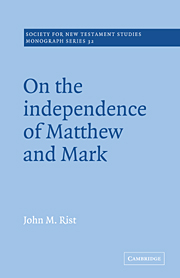Book contents
- Frontmatter
- Contents
- Author's note
- 1 Problems and assumptions
- 2 The Literary hypothesis: some preliminary tests (Mt 3:1 - 9:17)
- 3 Vocabulary and sequence: Matthew's version of Mk 2:23 - 6:13
- 4 More skimpings and bowdlerizings in Matthew
- 5 A turning point in the tradition (Mt 14:1, Mk 6:14, Lk 9:7)
- 6 Some passages about Peter in Matthew
- 7 From Caesarea Philippi to the Burial of Jesus
- 8 The end of Mark
- 9 Summary and prospects
- Appendix A M. D. Goulder on the Synoptic Problem
- Notes
- Index
Appendix A - M. D. Goulder on the Synoptic Problem
Published online by Cambridge University Press: 10 November 2009
- Frontmatter
- Contents
- Author's note
- 1 Problems and assumptions
- 2 The Literary hypothesis: some preliminary tests (Mt 3:1 - 9:17)
- 3 Vocabulary and sequence: Matthew's version of Mk 2:23 - 6:13
- 4 More skimpings and bowdlerizings in Matthew
- 5 A turning point in the tradition (Mt 14:1, Mk 6:14, Lk 9:7)
- 6 Some passages about Peter in Matthew
- 7 From Caesarea Philippi to the Burial of Jesus
- 8 The end of Mark
- 9 Summary and prospects
- Appendix A M. D. Goulder on the Synoptic Problem
- Notes
- Index
Summary
Recently a most learned student of the Synoptic Problem has been bold enough to push the theory of Markan priority to its logical extreme. In Midrash and Lection in Matthew (London 1974) M.D. Goulder proposes that Mark's Gospel is the earliest of the Synoptics, and that Matthew had almost no other evidence about the life of Jesus than Mark. His Gospel, therefore, is a kind of expansion, or revised second edition, of Mark. Luke, when his time came, wrote a Gospel based on Mark and Matthew together, with Mark as his primary source. Matthew's Gospel, according to Goulder, is thus related to Mark in a somewhat similar way to that in which Chronicles is related to Kings. This attractively radical proposal certainly removes many of the obstacles which have impeded Markan priority in the past: Mark is now indisputably the only source for the researcher who would like to write a biography of Jesus, and almost all Matthaean and Lucan variants can be summarily dismissed as pious fictions. But although removing certain traditional difficulties Goulder's thesis introduces others of so serious a nature that it must apparently be rejected almost in its totality. What will remain as of permanent value are Goulder's perceptive and detailed identifications of the basic characteristics of Matthew's Gospel as we have it.
The following objections to Goulder's proposal seem in many cases individually, and certainly cumulatively, decisive against it:
phenomena of time and context preclude any serious comparison between Kings/Chronicles and Mark/Matthew.
- Type
- Chapter
- Information
- On the Independence of Matthew and Mark , pp. 109 - 111Publisher: Cambridge University PressPrint publication year: 1978

